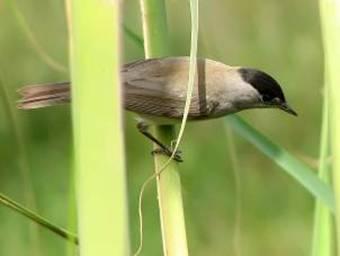The practice of maintaining bird feeders has caused an evolutionary change in European black-capped sparrows

A study conducted under the guidance of Dr. Martin Schaefer from the University of Freiburg (Germany) and published in "Current Biology" examined the migratory behavior of the black-capped sylvia, Sylvia areicapilla (appears in our country as transient/winter).
The sibich population that was tested spends the summer in Germany and when winter comes migrates to southern Spain, but it turns out that some of the migrants discovered the feeding trays prepared for them by the English, trays that attract them to the gardens of England and because of the availability of food make them stay in the gardens of England (despite the winter).
As the custom of feeding in English gardens developed, the sibichs were given a higher possibility of surviving the winter and returning and summering in Germany. Since England is closer (than Spain) to the nesting areas, the English complications precede the return, which allows them to "occupy" better places, meaning an advantage is created in favor of the English.
It turns out that those individuals that migrate to England (instead of Spain) create separate populations even when they return to Germany, populations are separated to such an extent that there is no reproduction between the populations (Spanish and English), of course this situation is equal and similar to geographic separation, lack of reproduction and separation that can lead to the development of a new species.
The researchers collected data in the nesting areas of the terns in Germany, and identified the differences between the "English" and the "Spaniards" by chemical markers/"signatures" taken from the claws (nails) of the birds. After identifying and separating the English from the Spanish, blood samples were taken and it turned out Differences that can be identified between the populations, morphological differences in the beak, wings and feathers were also identified. The civets that migrated to England (short route) developed a narrow and long beak and rounded wings, according to the researchers these are adaptations for a short flight path and eating seeds (and fat) from feeding trays, for a longer route nation and fruits from trees and shrubs that the Spanish eat.
That is: feeding birds in the gardens of England pushes the population of cycads to the separation that was created within 50 years and can over time lead to the creation of a new species, but according to Dr. Shaffer: the development of a new species can take hundreds of thousands of years and at this stage if the feeding stops, the English population will collapse and the situation may return to his predecessors.
It is worth noting that feeding birds, when done in the right places and in the right way, is an example of a positive activity that helps and strengthens populations, at the same time it is worth remembering that without (climate change) the warm winters in England, many of the "English" birds would not have survived.

6 תגובות
I didn't like the title: evolutionary feeding.
I can't understand what interest a ghost has in living things.
I can't figure out what's new here. After all, every living being adapts to its environment and changes.
Or they invent a new science that doesn't exist - difference between microevolution and macroevolution....
No matter how much evidence we provide them, the answer will always be:
No, there is no such thing as evolution, there must be a guiding hand!
Sorry in advance that I may be raising an unnecessary argument in a very interesting article. But it was on the tip of my tongue...